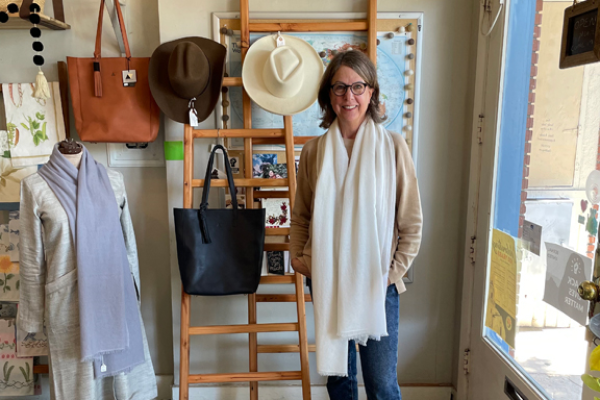We have known Laurie since the early days of 12 Small Things. Naturally, she was our top pick for community features and graciously accepted our invitation to chat about her experiences as a Cortland merchant.
How did you get started in the fair trade industry?
After working for 30 years in marketing for Esprit, The Gap, Williams Sonoma, and Red Envelope, I wanted to give back share by sharing my skills with others who could benefit. I met representatives from the non-profit group Aid to Artisans and enrolled in their program to learn how to help. Many artisan organizations were primarily women, but there were other groups where men were the artists at work, depending on the skills required.
I started 12 Small Things in 2009 after training with Aid to Artisans and a business class from the Renaissance Entrepreneurship enter. After working for such large corporations, I wanted to start small with just a few products; my husband suggested ten small things, and I rounded it to products from 12 artisan groups for the number of months in a year and after the twelve days of Christmas.
Can you describe the process you go through to select the products you sell and the criteria you use to ensure they are truly fair trade? How do you ensure those who make your products are paid fairly and treated well?
I select products for their beauty, the quality of how they are made, and the story behind their creation. Unfortunately, not all the groups I work with are certified in fair trade due to certification constraints. Still, I check with the organization before I purchase to ensure the artisans receive fair wages for their work, and I can usually tell from the price points, which are higher than machine-made or unfairly traded products.
What impact do you hope to have through 12 Small Things, and how do you measure that impact?
Martin Luther King Jr. once said, “If I cannot do great things, I can do small things in a great way,” which is a good motto to live and work by. I love selling these beautifully made products at my store and online, knowing that every small sale adds up to help a community that desperately needs income. I can also make a greater impact with wholesale representation for groups that can handle larger orders for retailers like World Market stores, selling some of my products.
How do you market your products to customers, and what role do you think education and awareness play in promoting fair trade?
Education and awareness of how our products are made are becoming more important to customers every year. If you’ve ever seen The True Cost about fast fashion, you may never want to buy a new article of clothing again. But people like to buy and give gifts to themselves and others; it’s embedded in our culture, so I am proud to feature sustainable, well-made products that don’t harm the earth and help support communities who continue these traditional skills.
Can you describe a product or collection you are particularly proud of and what makes it special?
I am particularly enamored of a collection from an organization called Made51 that represents the craftwork of refugee women around the world who are making holiday ornaments inspired by their homelands. I have been working over the past couple of years to find a large retailer to feature this inspiring body of work, and I think I may have found the right opportunity in time for holiday 2023 sales.
Why did you choose a storefront on Cortland?
I had been working in the living room of our home in Bernal Heights, selling retail orders online and representing other products wholesale for six years, when I saw a “for rent” sign in the window of the former Gifts on the Hill shop, owned by the Bernal Heights Neighborhood Center It had a small storefront but even bigger office where I could move all my samples and have our living room back again. I was on my way to a trade show in Las Vegas and promised myself if it was still available when I returned, I would apply for the space, and I did, and I got it!
How did you manage through the pandemic?
Retail storefront sales were already declining due to the competition online from Amazon, but they slowed down even more during the pandemic. One of my vendors in India started making cloth masks, which I sold on my website and couldn’t keep in stock. One of my talented neighbors started sewing cloth masks for some of her friends, and I asked if she’d make some for my store. I first bought a couple of dozen to make sure they’d sell and then continued to buy more and more each week for the better part of a year. I would ride my bike around the neighborhood delivering masks and other gifts people needed for birthday celebrations and special occasions.
How did you get involved with the Bernal Business Alliance?
I started attending BBA meetings when my friend Darcy Lee who owned Heartfelt, was the president, and I wanted to get out of my home office and show support for the organization. I’ve seen a lot of hope and joy when events bring the community together to celebrate the small pleasures of being a neighborhood, and I’ve seen how quickly those hopes can get tarnished by an act of bad faith, vandalism, lack of support, and a pandemic.
What do you hope for in the relaunch of BBA?
With a relaunch of the Bernal Business Alliance, we can involve a lot more people from the community to bring their experience and voices to our organization to accomplish small things we all can enjoy in a great way.

